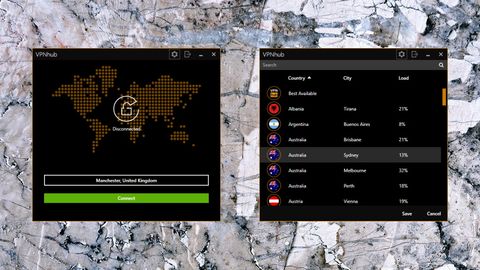TechRadar Verdict
Maybe worth a try for the free plan, but the paid service is just a little too expensive for what you get.
Pros
- +
Limited free plan with unlimited bandwidth for mobile
- +
Excellent speeds
- +
Unblocks US Netflix content
- +
Supports up to 10x simultaneous connections
Cons
- -
Free plan not available for desktops
- -
Doesn't unblock iPlayer, Amazon, Disney+
- -
Prices a little above average
- -
Underpowered apps (and some Windows bugs)
Why you can trust TechRadar
VPNhub is a capable VPN provider run by the people behind adult video site, Pornhub.
The company says this is all about the anonymity of its users, stating that 'with 90 million visitors a day, the vast majority of whom are using devices on the go, it’s especially important that we continue to ensure the privacy of our users and maintain their confidentiality.'
You don't have to watch Pornhub – or even porn – to use the service, though, and the VPNhub website is as family-friendly as any VPN provider.
VPNhub's free plan sounds like it should appeal to just about anyone, with the website claiming it offers 'unlimited bandwidth on your device of choice.' What it doesn't highlight is that this gets you access to a single location only, not necessarily in your own country, and the free plan is only available on iOS and Android. Still, a free VPN with unlimited bandwidth is always going to be useful.
- Want to try VPNhub? Download it here
Signing up for the Premium plan gives you access to locations across 60+ countries, as well as faster speeds, and allows you to use the service on Windows and Mac.
VPNhub Premium supports simultaneous connections from up to ten devices, too, twice the industry standard.
We're normally cautious of small VPNs offering lots of locations, as it's not always clear who is behind their network. VPNhub uses servers owned by StackPath, though, the cloud giant behind IPVanish, which gives some reassurance about likely service reliability.
Pricing starts high, at $13.99 billed monthly, but drops to $6.99 if you pay for a year upfront, $4.99 over two years, or $3.49 over three. (Forget Bitcoin, there's not even PayPal support - payments are by card only.)
That's fair value, but you could still save a pile of cash by shopping around. Private Internet Access asks just $2.85 a month for its first 14 months, then $3.33 on its annual plan alone - no need for long term contracts. But if you're happy to sign up for longer, Surfshark's two-year plan is an effective monthly $1.99.
Still, if you'd like to try VPNhub Premium, sign up at your app store of choice and you'll get a week of testing time before you're charged.
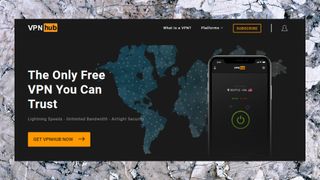
Privacy
VPNhub's privacy policy is detailed, but lengthy. Really, really lengthy - more than 4,500 words - but well-chosen titles like 'Information we collect...' help you jump straight to the details you need.
The policy explains that 'we do not associate your IP address with your online activities and we do not store or log your IP address with your online activities.'
Reassuringly, it also states that 'we do not keep logs of your online activities and will never associate any domains, websites or applications that you use with you, your device or your email.'
But that's not the whole story. The policy also includes this key section.
"We and our third-party service providers may automatically collect, use, store and transfer the following information about you or your device as follows:
When VPNhub app is launched, but before you connect to the VPN, we and our third party service providers collect device-specific information such as unique mobile ID, operating system and platform, browser type and version, network information and other technology on the devices you use to access the Website or the Services."
VPNhub may not log what you're doing online, but it can fingerprint your device and grab plenty of information about it, and that data may be accessible to others.
The free VPN is supported by ads, and as the policy explains, that has further implications:
'Advertisers may be able to collect certain information independently from you or your device when serving ads from our Services, including your device’s advertising ID, IMEI, MAC address, and wireless carrier. Advertisers may be able to access your IP address if your device is not connected to the VPNhub VPN.'
Put this all together and VPNhub clearly has a few privacy issues. That may not matter if you just want a simple VPN to encrypt regular internet traffic on public Wi-Fi, but we would think carefully before you use the service for anything important.
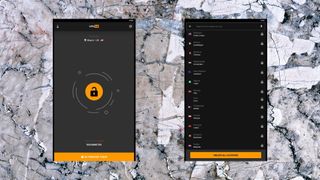
Android app
VPNhub free build is only available on mobile devices, so we began by grabbing a copy of the Android version. Installation was hassle-free, and we were launching the app within a few seconds.
After some initial over enthusiastic upselling where the app kept prompting us to try the Premium version, we were able to get started. A simple interface keeps everything very straightforward: tap an unlocked padlock to connect, tap it again to disconnect, and that's about it.
The last time we looked at VPNHub's free service, it only allowed us access to our local UK server. This time we were always allocated a US location, maybe handy for unblocking, but reducing speeds a little.
The Settings panel has a couple of interesting features. Split tunneling enables both free and Premium users to define apps which won't send their traffic via the VPN. An 'Obfuscate Connection' option might help you get connected in countries which block VPNs.
There's also an Auto Reconnect Upon Disconnect option to quickly recover if the connection drops. That's only available to Premium users, though, leaving free users more exposed than we'd like.
That's a little more functionality than we'd expect from a free service, but quality Android apps often go much further: autostart options, automatic connection when you access untrusted networks, choice of protocols, an integrated kill switch, and more. VPNhub looks very basic by comparison.
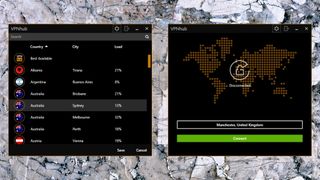
Windows
VPNhub's Windows client opened with the simplest of interfaces, just the name of the currently selected country, and a Connect button.
Clicking the country name displays a list of your other location choices, sortable by country, city or server load, and with a search box to filter the list by keyword. That's good, but we would have preferred a Favorites system, or even a Recent Servers list, to help speed up reconnecting to commonly accessed locations.

he Settings box is far more capable, with options to choose your protocol (IKEv2 or OpenVPN), scramble OpenVPN traffic to help bypass VPN blocking, enable or disable a kill switch, or have the app automatically reconnect if the VPN connection unexpectedly drops.
The connection process is handled well. Connection times are fairly short, a desktop notification tells you when you're protected, the client displays your new virtual location and IP address.
Disconnects are more a problem. When we simulated a VPN connection failure, the client updated its status to 'disconnected', but didn't alert us with a notification, and it's not set up to automatically reconnect by default. Worst case, the VPN drops, but you continue to think you're protected, for as long as it takes before you switch back to client and see its status.
Enabling auto-reconnect made a real difference, all on its own. We forcibly closed both OpenVPN and IKEv2 connections, but in both cases the client immediately noticed, reconnected, then gave us its usual 'you are now connected to...' notification. Our traffic was exposed, but only for a few seconds.
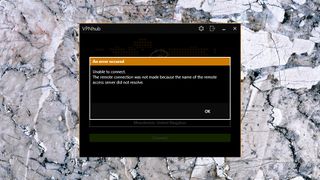
We tested VPNhub's kill switch, with mixed results. When we forcibly closed the VPN connection, the client immediately blocked our internet access, preventing any data escaping the tunnel. But sometimes it then refused to connect, warning us 'the name of the remote access server did not resolve.' We had to close and restart the client before it would work again.
As we tried the clients, we noticed a few other small issues. The location list was sorted alphabetically by default, for instance, but sometimes we'd find the client had rearranged the servers for no apparent reason (we're talking sequences like Serbia, Australia, United Kingdom, Denmark, Canada, Singapore...) You can fix this quickly by clicking the Country column header to reset the sort order, but it really shouldn't be necessary.
It's a similar story at the login screen, where at one point we kept getting a message saying, 'unspecified error.' After it cropped up two or three times we realized this is the message you get if you accidentally enter the wrong password, but the client really should be smart enough to specifically tell us that, in the first place.

Performance
VPN's site unblocking performance is average at best; it got us access to US Netflix content and easy targets like US YouTube, but failed with BBC iPlayer, Amazon Prime Video and Disney+.
Our speed tests got off to a much better start, with VPNHub's free service managing 30-35Mbps over wifi on a UK-US connection. Your results may be very different as you're not able to choose your location, but that's still a good starting point, and already outperforms some commercial VPNs.
Switching to the paid version allowed us to select our nearest UK server, and sure enough, that made a significant difference, with downloads averaging 65Mbps on our 75Mbps test line.
We ran a second set of tests from a European data center capable of more than 500Mbps, and VPNhub still performed very well at an average 180-190Mbps.
The good news continued right up to the end of the review, with our final privacy test finding VPNhub's servers really were in the promised locations, and there were no DNS or WebRTC leaks to give away any details about us or our web activities.
Final verdict
VPNhub's free unlimited bandwidth plan is fast and may work for basic browsing, but the lack of features and marginally above average prices make it hard to recommend.
- We've also highlighted the best VPN

Mike is a lead security reviewer at Future, where he stress-tests VPNs, antivirus and more to find out which services are sure to keep you safe, and which are best avoided. Mike began his career as a lead software developer in the engineering world, where his creations were used by big-name companies from Rolls Royce to British Nuclear Fuels and British Aerospace. The early PC viruses caught Mike's attention, and he developed an interest in analyzing malware, and learning the low-level technical details of how Windows and network security work under the hood.
